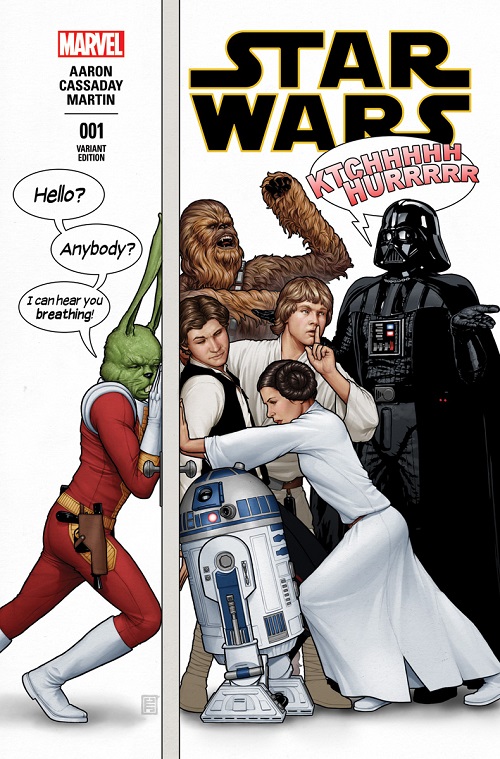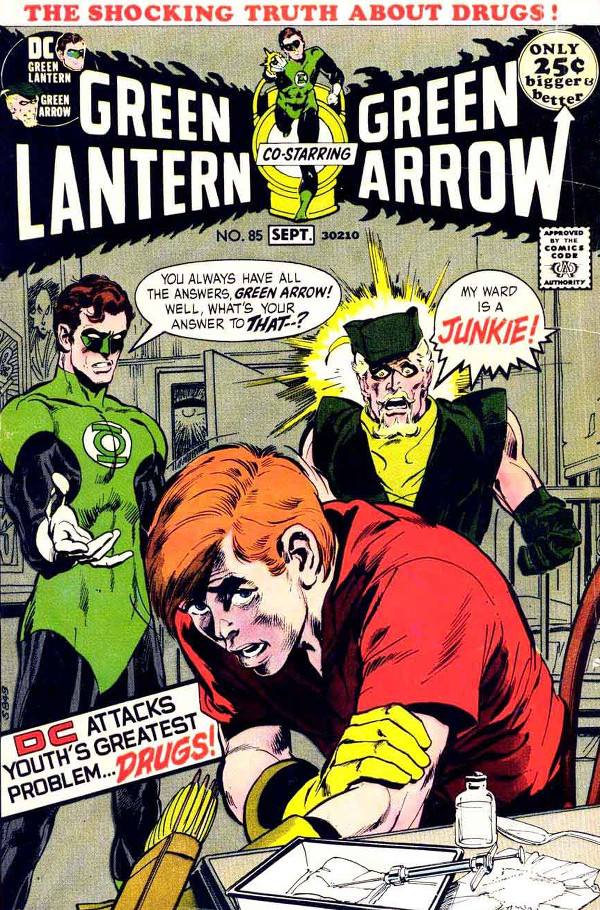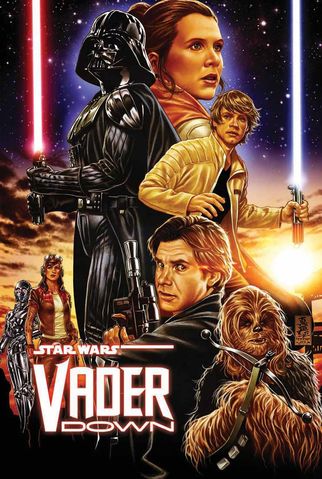 Mike: When I was first acquainting myself with the Star Wars franchise in the late nineties, the volume of Expanded Universe material I felt it necessary to catch up on was already quite daunting—most of a decade’s worth of novels and comics were already out there, and more were arriving all the time. Luckily, one huge batch of content was pretty widely regarded as not worth my time: the original 107-issue Marvel Star Wars comic series. Having run from 1977 to 1986, it was more than a decade out of print by the time I laid eyes on A New Hope, and to say the stories had fallen out of fashion during the peak of the Bantam era would be an understatement. So for a long time, I didn’t see a reason to go anywhere near them.
Mike: When I was first acquainting myself with the Star Wars franchise in the late nineties, the volume of Expanded Universe material I felt it necessary to catch up on was already quite daunting—most of a decade’s worth of novels and comics were already out there, and more were arriving all the time. Luckily, one huge batch of content was pretty widely regarded as not worth my time: the original 107-issue Marvel Star Wars comic series. Having run from 1977 to 1986, it was more than a decade out of print by the time I laid eyes on A New Hope, and to say the stories had fallen out of fashion during the peak of the Bantam era would be an understatement. So for a long time, I didn’t see a reason to go anywhere near them.
Much later, well after the prequels were over, I finally decided to give them a go. It took two tries—first in 2009 and again in 2013 after Episode VII had been announced—but I eventually worked my way through the whole series. I got to experience firsthand things I’d been aware of in some cases only by rough description (Jaxxon, Arbra, Valance the Hunter) and in other cases by their appearances in more recent EU (Zeltrons, Nagai, and of course Lumiya). Reading almost ten years’ worth of comics over a (cumulative) span of several months, the series’s evolving tone was incredibly pronounced, from the borderline slapstick of the earliest stories to the relative seriousness of the Kiro and Tay Vanis storylines to, near the end, a tenuous balance between the two extremes as the Hiromi weaseled their way into the Nagai/Tof conflict.
My point being, the series definitely ran the gamut from completely batshit ridiculous to surprisingly artful and compelling, especially in its second half once The Empire Strikes Back had expanded people’s perception of what a Star Wars story could be. In other words, it had pretty much the same track record as the later EU—certainly close enough that none of it felt all that out of place. Fast-forward to a year ago, when the EU had been swept away and we once again found ourselves reading a Marvel Star Wars #1. It was going to be different this time, was the feeling—the first issue even had an alternate cover (above) with the main characters locking Jaxxon himself out of the story. And sure enough, the first year’s worth of new Marvel SW comics have by and large been very successful, if not universally beloved.
One big benefit this time around is knowing the entire story upfront—the earliest stories exhibited a fierce reluctance to move things forward, even keeping the Rebels on Yavin in defiance of all common sense—so Marvel’s writers can big a little deeper into who the characters are in the aftermath of ANH and what the larger political/military context is. But being familiar with a few different eras of Big Three stories now, I can’t help but wonder if things really are different. Not from a continuity standpoint (some will gladly raise the prospect of another reboot down the line), but from, I guess, a “seriousness” standpoint. Are the new SW comics truly deeper and more sophisticated now, or do they just feel that way because they’re a product of the same times we are? What are the odds that in twenty years we’ll look back on something like, say, the murderbots in Darth Vader, and find them hopelessly silly?
 Ben: I think it would be fair to say the audience for comics has changed and that has driven changes in the writing.
Ben: I think it would be fair to say the audience for comics has changed and that has driven changes in the writing.
It used to be that comics were perceived as something for children and teenagers, then you grew up. That changed, with people reading comics into their twenties and thirties, then the popularity of trades changed it again. Now material was more easily available and gave the medium more outward respectability – it was no longer cheap pamphlets, but bound books, with titled spines! At the same time titles like Maus, Sandman and Watchmen redefined the possibilities of what could done in comics.
An older audience meant stories that were more complex, but this has also over the last few years and decades gradually led to better representation in terms of gender, ethnicity and sexuality. If anything, one criticism of this direction is that it’s become harder to find comics that can be given to kids to start them off! A few years back, when Marvel infamously had Ares very graphically torn in two by Sentry, with a full, detailed double-page spread of said dismemberment, some of the response was to the effect of: “The fuck? Seriously?” There’s a time and a place for that stuff and for many Marvel’s mainstream superhero books wasn’t it.
I’d say Marvel’s writers are acutely aware of the need to cater to an increasingly varied and sophisticated audience. They’re also aware though that sophistication doesn’t always mean a story must be deadly serious. Kieron Gillen, in particular, tends to use some quite dark humor in the Vader book to lighten it up, even when the means are a pair of psychopathic robots. Aaron tries to do comedy, but it doesn’t always work out – it did with Han piloting an AT-AT, but not when his supposed “wife” turned up later.
Will any of the new stuff jump the years and decades? Possibly. I think the change in writing gives it better odds than some of what preceded it, but the medium will continue to develop. Sometimes that will render what came before simpler, sometimes lesser, but not always. Material by Stan Lee or Chris Claremont, 50-60 and 30-40 years old now, still works, but it’s akin to reading Shakespeare. You have to adjust to the style of the era, not the other way around.
David: I think it’s unavoidable: in a couple of decades, we will find the current batch of comics to be silly. It’s just how superhero comics work, and the Star Wars comics are penned and drawn by some of the biggest names Marvel has and thus are subject to the same changes in sensibilities. The Silver Age generation of the 1960s wanted entertainment that felt more sophisticated than the World War-era Golden Age comics, adding personal problems to the larger-than-life heroes of the past (the Fantastic Four bicker like a real family and previously straight-faced Captain America agonizes over being a man out of time). The Bronze Age era of the 70s-80s found the Silver Age unreal and out of touch, and started adding some awkward and hamfisted attempts at social relevance (Spider-Man fights against drugs and Green Arrow has a junkie sidekick). The Iron Age writers of the nineties, blinded by the bright lights of Watchmen and The Dark Knight Returns and influenced by the aggressive pop culture of  Reagan-era America, decided to turn everything gritty, grim and violent (Batman is a zealot with a flamethrower and the Avengers have members called Deathcry and Cybermancer). And our current batch of writers has rediscovered the joy of Silver Age sensibilities while they try to marry them to a more sophisticated way of storytelling.
Reagan-era America, decided to turn everything gritty, grim and violent (Batman is a zealot with a flamethrower and the Avengers have members called Deathcry and Cybermancer). And our current batch of writers has rediscovered the joy of Silver Age sensibilities while they try to marry them to a more sophisticated way of storytelling.
I’m speaking as someone who never found Jaxxon to be inherently worse than Threepio: the trash-talking green rabbit would never have worked on screen (although Rocket Raccoon probably has something to say about that), but he works just fine on the comic page. Still, I can’t help but find the character designs and storytelling style of the old Marvels to be old-fashioned and thus slightly off, enjoyable more as a historical artifact than as a piece of entertainment.
Just as we are now starting to see how dated some the characters of Shadows of the Empire are (some perfect representations of Iron Age sensibilities like pouches-and-guns hero Dash Rendar, ponytailed retcon Prince Xizor, and aerobic costumed Princess Leia) it’s inevitable that it will happen again: the writers of the future will look upon the murderbots, or upon Vader having a crew that’s a dark mirror of the heroes of Yavin, or upon the bodybuilding Hutt and his gladiator arena, and they will find it cheesy, or unrealistic, or not gritty enough, or not idealistic enough, or who knows, but they will find them off. Comics are one the clearest reflections of the zeitgeist and, as such, they tend to age pretty badly.
Ben: On this one I’m not actually as cynical! Some comics writing does jump the years and still reads flawlessly, but I’d accept those tend to be rare exceptions. In a lot of ways it’s all about style – Busiek and Perez have done a fair amount of superhero work, but read now it is clearly a product of its time. In contrast Sandman reads just fine, as do titles like Bone. So I don’t think it is quite so cut and dried, especially when you start looking at genres outside of superheroes.
At the same time, comic companies have made a good amount of profit out of re-issuing older material, which says current audiences are as interested in old stuff as they are current. I have no reason to think that will change in the future, especially with material being available digitally.
David: I kind of agree, and that’s why I insist that Star Wars works in the same arena as superhero comics, as pop, pulpy amusements. But even then, I don’t see it as cynicism, but as a trait that doesn’t necessarily devalue the original work — it might actually work in their favor, as you are able to see what was substance and what was smoke and mirrors. As I said, I love Jaxxon! I don’t think there’s anything intrinsically negative to popular comics inevitably becoming cultural artifacts of their time. Sandman, for example, is forever linked in my mind to the rise of the Goth subculture, just like I can’t read V for Vendetta without thinking of Thatcherism. It’s (perhaps obviously) the same with movies: the language changes, sure, and the works become dated, but doesn’t mean they are any worse for that.
 Ben: I’d agree that Marvel are certainly transferring a good deal of their current superhero techniques to the main Star Wars story: twin titles, mini-events, annuals, an overall ongoing plot. But Marvel have only really been using that set of techniques for the last handful of years, so that may be what gives the books their time stamp so to speak.
Ben: I’d agree that Marvel are certainly transferring a good deal of their current superhero techniques to the main Star Wars story: twin titles, mini-events, annuals, an overall ongoing plot. But Marvel have only really been using that set of techniques for the last handful of years, so that may be what gives the books their time stamp so to speak.
Rocky: Even though I know almost nothing about comics, I do have some input on this! From a book-publishing standpoint, many of the old Bantam novels were some of the silliest ever published in the Star Wars universe, despite how much I love them. At the time they were published, they kept making the New York Times bestseller list, and were widely read by the fandom. Perhaps the view on the current run of comics will change in time, just like how the older comics are often laughed at now. What is considered excellent literature or comics changes over time as people’s tastes and expectations change, and only time will tell what the current run of comics will be remembered for.
On the good-news front, there are no funny-looking World Devastators or cloned Emperors in these versions of comics, right?
Mike: I happen to think the World Devastators look pretty damned cool, but is there anything that crazy in the current crop of comics? You’ll have to read some and find out, won’t you, Rocky?
I’m starting to think I really did ask two different questions here—are modern comics more complex than older comics (absolutely), and are they going to hold up better over time? That one seems less likely. As you said, David, even much more recent stories like Shadows of the Empire—a book I still appreciate without shame—can be rife with dated undertones and ideas that are far harder to stomach than a little silliness. I imagine a lot will depend on just how the vogue evolves from here; luckily, Aaron and Gillen are both relatively young writers so it’s entirely possible their voices will remain in fashion for a good long while.

It’s not just you Coop – World Devastators are cool.
It’s interesting that comics as a visual and narrative medium go through this process of becoming dated, in a way that I don’t think the Star Wars movies do. Sure, the Original Trilogy has some wonky hairstyles and room-sized computers that would place it in the early 80s, but on the whole I’m not sure that it has become dated in the same way that many of the comics discussed here have.
I think the comparison to the films clarifies what’s going on here—everything in SW is meant to feel timeless, but in a major motion picture there’s way more time and attention being paid to that than in a monthly comic. Especially in those first few years after ANH.
Do you think that the continuous updates to the OT might also impact its longevity? I know that Lucas’s later alterations to the movies are pretty controversial, but the repeated updates (especially to the technical SFX aspects) may help explain why the movie has avoided feeling (overly) dated.
Those hairstyles, though…
Ha. As a Special Edition baby myself, I think I’ll plead the fifth on that one. 🙂